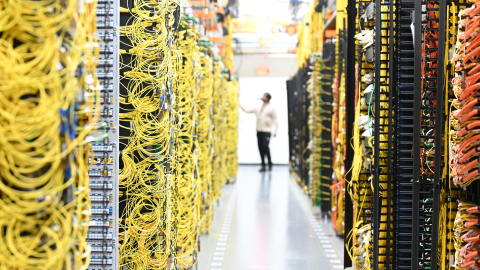Earlier this month, we hosted an event in Spain to announce investments in three new water projects in Aragon. The projects reduce flood risk for 700,000 residents in the region of Zaragoza (where the AWS Europe (Spain) Region is located), modernise critical infrastructure, and optimise agricultural water use through artificial intelligence (AI). It’s a fantastic example of how policymakers can come together with businesses to make a meaningful impact.
This theme of collaboration has been central to conversations I’ve been having with our European customers in recent weeks, and I believe now is the right time to reflect on some of the important questions I’ve been receiving on how AWS is invested in their future. These questions are broadly bucketed under three areas: competitiveness, digital sovereignty, and innovation.
Strengthening Europe’s competitiveness
First, customers want to know how AWS is supporting Europe’s competitiveness.
The key to delivering a more competitive Europe lies in harnessing new cutting-edge technology and infrastructure to drive growth, boost innovation, and enhance security and resilience. We contribute to these goals through our significant investments and unwavering commitment to serving our European customers.
Our roots in Europe run deep, and we’ve been contributing to economic growth and job creation for more than 25 years. This includes investing over €250 billion since 2010 and employing more than 225,000 people across the continent. Many of these employees have been with us for more than a decade, and have played a crucial role in some of the foundational services we build for customers. For example, the teams at our research and development centres in Ireland and Germany help develop cutting-edge technology for Amazon Elastic Compute Cloud (Amazon EC2).
We’ve also made significant investments in infrastructure. We now have eight AWS Regions in Europe, and infrastructure in more than 20 countries across the continent. Last year, we announced tens of billions of euros of new investments in our data centres, including in France, Germany, Italy, Spain, and the UK. It's important to remember these are long-term capital investments, in permanent physical structures like new data centres, which can take years to build and scale. In some cases, these investments will be made over time horizons of more than 15 years.
As AI reshapes the global economy, these investments will help strengthen Europe’s competitiveness on the global stage. Recent research found that 42% of European businesses are now consistently using AI, putting us on track to meet the European Commission’s target of 75% adoption by 2030. The potential economic impact is significant, and if momentum continues, cloud-enabled AI could add more than €400 billion to Europe’s GDP by 2030. We will continue to support this opportunity by helping enterprises, startups, and public sector organizations unlock the power of cloud computing and AI so they can drive innovation, productivity, and growth.
Critical to supporting this adoption is ensuring organizations have access to the right digital skills, and we are investing in training and education programs across Europe to help make this happen. For example, in 2023 Amazon committed to providing two million people of all ages with free AI skills training by 2025, and we were proud to meet this goal a year early.
Investing in Europe’s digital sovereignty
The second topic I have been asked about is digital sovereignty. Questions on this topic are often driven by misconceptions around where data is located, who can access that data, and the resilience of the cloud. Let me explain the commitments we make to customers.
For customers who need to meet stringent operational autonomy and data residency requirements, we are launching the AWS European Sovereign Cloud, a new, independent cloud for Europe, backed by a €7.8 billion investment. However, our approach from the beginning has been to make AWS sovereign-by-design. Customers have complete control over where they locate their data, and they can choose to deploy their data into any of our eight existing Regions in Europe, with the knowledge that their content will not leave that Region without their agreement.
Customers also have verifiable control over who can access their data. The AWS Nitro System, which powers all our modern Amazon EC2 instances, provides a strong physical and logical security boundary to enforce access restrictions so that nobody, including AWS employees, can access customer data. AWS services also support encryption, whether in transit, at rest, or in memory, with customer-managed keys that are inaccessible to AWS. Any data that is encrypted is rendered unreadable without the associated decryption key, which means customers have complete control of who accesses their data.
Finally, control over workloads and high availability are essential in the case of events like supply chain disruption, network interruption, and natural disaster. Amazon has made significant investments in building and running the world’s most resilient cloud. Each AWS Region is comprised of three or more Availability Zones (AZs), which provides customers with high availability and greater resilience when compared to typical on-premise data centres.
We also maintain multiple redundant network paths between our Regions and within those Regions. Our entire network is designed so that even if the network were to sustain path failures, we have multiple alternative network paths available for routing traffic, and we diligently capacity plan for this. We have a proven track record during crises, including working with Ukraine government officials to help support their digital sovereignty and keep vital government services operating and secure.
Supporting innovation in Europe
The final theme is how we create the right environment to boost innovation in Europe. Mario Draghi’s report on the future of European competitiveness looked at how digitalisation and AI can drive innovation and economic growth across the continent. For our part, we want to help every company become an AI company, and we offer customers in Europe a wide range of AI capabilities to help deliver secure and safe innovations.
This includes performant and low-cost infrastructure to run AI workloads, a choice of leading foundational models through Amazon Bedrock, and generative AI applications like Amazon Q. We are proud to work with a wide array of European innovators – from startups to enterprises – who are using these services to break new ground, from accelerating medical breakthroughs to ensuring the future of farming.
To sustain this, we believe it is important for countries and businesses across the continent to have access to the most secure, cutting-edge technologies and infrastructure available, so they can continue to innovate and build the best customer experiences.
It’s why we support proposals that simplify rules for businesses in the EU Single Market and enable trade in services within the European Union and internationally. And it’s why we will continue to work with governments across the world, including the European Commission, the European Parliament, and Member States, to support policies that help our customers achieve their goals.
Our support for our customers in Europe is steadfast, and we are proud of the significant contributions we are making in the economy and local communities. We will continue to focus on delivering the best possible experience for our customers so they can invent, scale, and thrive in the global economy.













